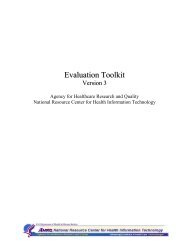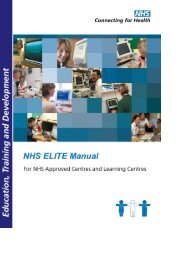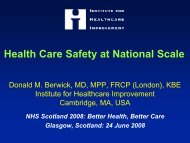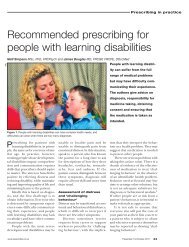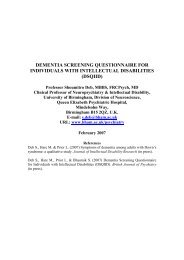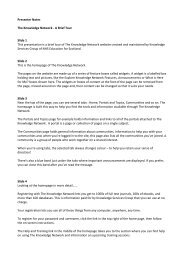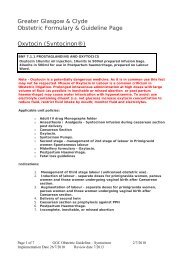The Fife Dementia Strategy: 2010 â 2020 - The Knowledge Network
The Fife Dementia Strategy: 2010 â 2020 - The Knowledge Network
The Fife Dementia Strategy: 2010 â 2020 - The Knowledge Network
You also want an ePaper? Increase the reach of your titles
YUMPU automatically turns print PDFs into web optimized ePapers that Google loves.
detailed guide to disseminating information and sharing skills with people with<br />
dementia and their carers. Work currently being complete by Health Scotland<br />
surrounding improving information provision in dementia care is due to be<br />
complete in <strong>2010</strong> and should be used in the development of the learning<br />
pathway for <strong>Fife</strong>.<br />
Developing the patient and learning pathways in-line with both the generic<br />
and dementia-specific Integrated Care Pathways will help to prevent<br />
duplication of work, allow for integrated evaluation, and ensure learning is<br />
taking place across all settings. Work on the Integrated Care Pathways is<br />
ongoing, and currently in <strong>Fife</strong> there is a need to focus on the applicability of<br />
the pathway for both health and social care providers in terms of how it will<br />
function as a holistic tool. For Integrated Care Pathways to effectively function<br />
ongoing work will be required in addition to current awareness raising<br />
sessions.<br />
4.2.2 People with dementia receive appropriate treatment and care for<br />
their dementia and other health conditions from clinicians trained in<br />
their prescription, delivery and review.<br />
Advances in the understanding of the changes or disturbances resulting from<br />
dementia have altered the management of patients with these disorders from<br />
a conservative, symptomatic approach to a more biologically and medically<br />
specific one. <strong>The</strong> mainstay of management is still based on the individual’s<br />
symptoms but the future promises the development of disease-specific and<br />
disease-modifying treatments which are currently only available in clinical<br />
trials. Recent attention in population health studies have also highlighted the<br />
importance of co-morbidity and frailty in the clinical picture resulting in a need<br />
for holistic patient centred treatment.<br />
In order to ensure people with dementia in <strong>Fife</strong> are offered the best in<br />
treatment and care for their dementia and other health conditions a number of<br />
treatment and review procedures will need to be established. <strong>The</strong>se have<br />
been broken down into those pertaining to dementia specifically, and those<br />
related to other health conditions.<br />
A. <strong>Dementia</strong> specific treatments<br />
Symptomatic (cognition enhancing) - Cholinesterase inhibitors should be<br />
openly available for all patients with a diagnosis of dementia and should be<br />
prescribed according to recommendations published in the SIGN guidelines 19 ,<br />
depending on the dementia subtype. Treatment with this type of medication<br />
must be based on robust specialist assessment and diagnosis. Responsibility<br />
for initial prescription should be taken by the specialist making the diagnosis<br />
and thereafter be under joint review with primary care as advised in the Area<br />
and Drugs Committee Shared Care Protocol for Cholinesterase Inhibitors<br />
2008 20 .<br />
19 SIGN (2006).<br />
20 NHS <strong>Fife</strong>. Area and Drugs Committee Shared Care Protocol for Cholinesterase Inhibitors<br />
2008. http://www.fifeadtc.scot.nhs.uk/interface/fife_scp/Cholinesterase%20Guidlines.pdf<br />
30




